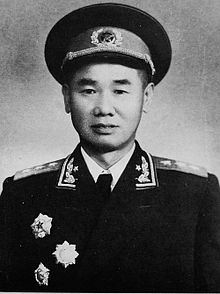Chen Zaidao
Chen Zaidao ( Chinese 陈再道 , Pinyin Chén Zàidào * 24. January 1909 in Macheng , Hubei , † 6. April 1993 ) was a Chinese general of the People's Liberation Army and politicians of the Chinese Communist Party (CCP). He was the commander of the Wuhan Military Region between 1955 and 1967 and as such was dismissed as a result of the Wuhan incident . He was later rehabilitated and last served from 1983 to 1988 as Vice-Chair of the Political Consultative Conference of the Chinese People .
Life
Chen Zaidao came from a poor peasant family and took part in revolutionary struggles for the student and peasant movement at an early age, for example in the autumn harvest uprising in 1927 led by Mao Zedong . He fought at the side of later generals like Qin Yiwei and Xu Shiyou in the Chinese Civil War . In 1928 he became a member of the Chinese Communist Party (CCP) and in October 1934 was a participant in the Long March . During the Second Sino-Japanese War , which began in 1937 , he was part of the 8th March Army and fought with the later General Song Renqiong between August 20 and December 5, 1940 in central China in the Hundred Regiments Offensive , a large-scale campaign of the Chinese Red Army against the Japanese Army . He later took part in the civil war with the 8th March Army in the summer of 1947 in the fighting in the Dabie Mountains and from November 6, 1948 to January 10, 1949 in the Huaihai offensive against the forces of the Kuomintang . In March 1949 he became commander of the Henan military region and held this post even after the founding of the People's Republic of China on October 1, 1949 until March 1955, whereupon General Bi Zhanyun became his successor.
In 1955 he was promoted to general . Chen himself then became commander of the Wuhan military region in May 1955 . During his service there, during the Cultural Revolution on July 20, 1967, the so-called "Wuhan Incident" occurred, in which around 1,000 people were killed. Despite the fact that the Cultural Revolution banned the use of violence, in July 1967 the city of Wuhan became the site of armed clashes between two major rival rebel groups: the "Million Heroes" and the " Wuhan Workers' General Headquarters ". The latter group, which was 400,000 strong, was besieged by the "million heroes". These were supported with weapons and soldiers by Chen Zaidao. Prime Minister Zhou Enlai ordered Chen to end the siege, and when Chen ignored it, Central Committee International Relations Deputy Head Wang Li and Public Security Minister Xie Fuzhi were sent to Wuhan to resolve the crisis. On July 19, they ordered the People's Liberation Army to no longer support the “million heroes” but rather the “General Headquarters”. The attempt failed: Xie was arrested by the People's Liberation Army the next morning, and Wang was kidnapped and ill-treated by the “million heroes”. Zhou sent further units of the People's Liberation Army to Wuhan with three infantry divisions, gunboats and an airborne force, which eventually forced Chen to surrender. Xie and Wang returned to Beijing as heroes after their liberation. He was then replaced as commander of the Wuhan military region by General Zeng Siyu and released from the People's Liberation Army.
Chen Zaidao was rehabilitated in 1972 after the incident involving Marshal Lin Biao , who was killed in a plane crash on September 13, 1971 after he had planned a coup , according to official reports. He then became the deputy commander of the Fuzhou Military Region . In September 1977, he replaced General Wu Kehua as commander of the People's Liberation Army Railway Corps and held this post until January 1983. He was a member of the National People's Congress and from 1978 to 1983 a member of the Standing Committee of the National People's Congress . He last served from 1983 to 1988 as Vice-Chair of the Political Consultative Conference of the Chinese People .
In the spring of 1989, along with Ye Fei , Zhang Aiping , Yang Dezhi , Xiao Ke , Song Shi-Lun and Li Jukui , Chen Zaidao was part of a group of six former generals who wrote a letter dated May 21, 1989 urging the government to call the People's Liberation Army should not act against the student protest movement in Tian'anmen Square and demand a peaceful solution:
- “Due to the urgent circumstances, we as old soldiers make the following request: Since the people's army belongs to the people, it cannot take action against the people, let alone kill the people and must not shoot at the people or cause bloodshed. In order to prevent the situation from escalating, the army is not allowed to enter the city. "
Web links
- Aiwu Song: Biographical Dictionary of the People's Republic of China , pp. 45 f., McFarland, 2013, ISBN 0-7864-3582-8 ( online version )
Individual evidence
- ^ Maurice Meisner: Mao's China and After: A History of the People's Republic Since 1949 . P. 354, Free Press, 1986
- ↑ Thomas W. Robinson: The Wuhan Incident: Local Strife and Provincial Rebellion During the Cultural Revolution , in: The China Quarterly (1971), 47, pp. 413-18
| personal data | |
|---|---|
| SURNAME | Chen, Zaidao |
| ALTERNATIVE NAMES | 陈 再 道 (Chinese) |
| BRIEF DESCRIPTION | Chinese general, politician in the People's Republic of China |
| DATE OF BIRTH | January 24, 1909 |
| PLACE OF BIRTH | Mach , Hubei |
| DATE OF DEATH | April 6, 1993 |
| Place of death | Beijing |
